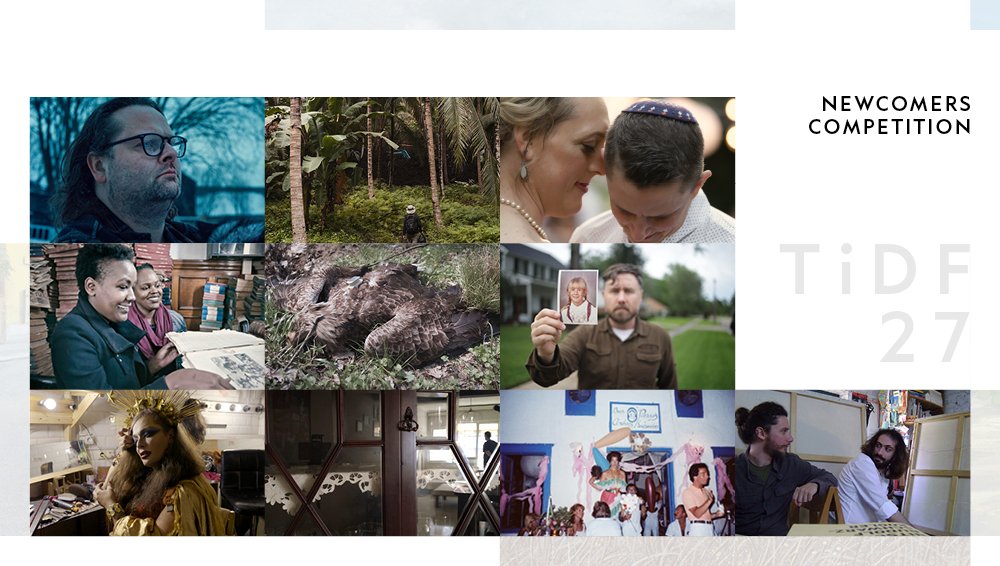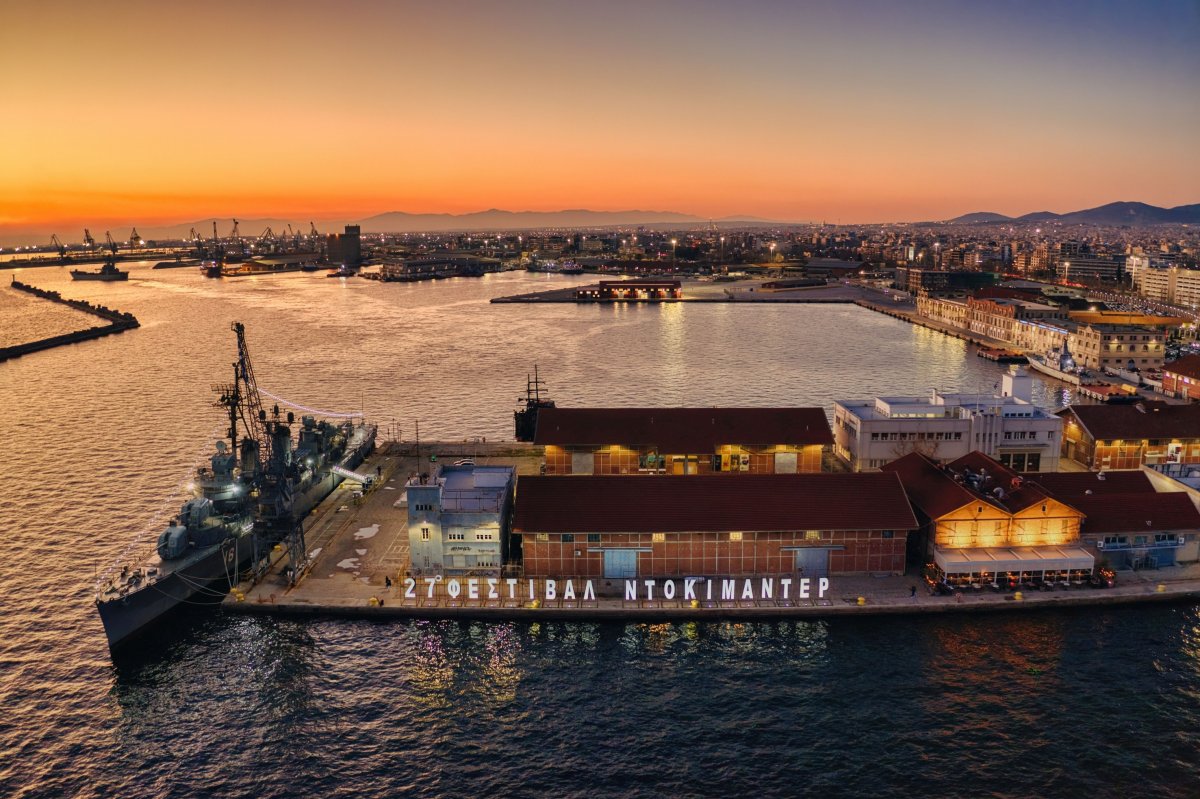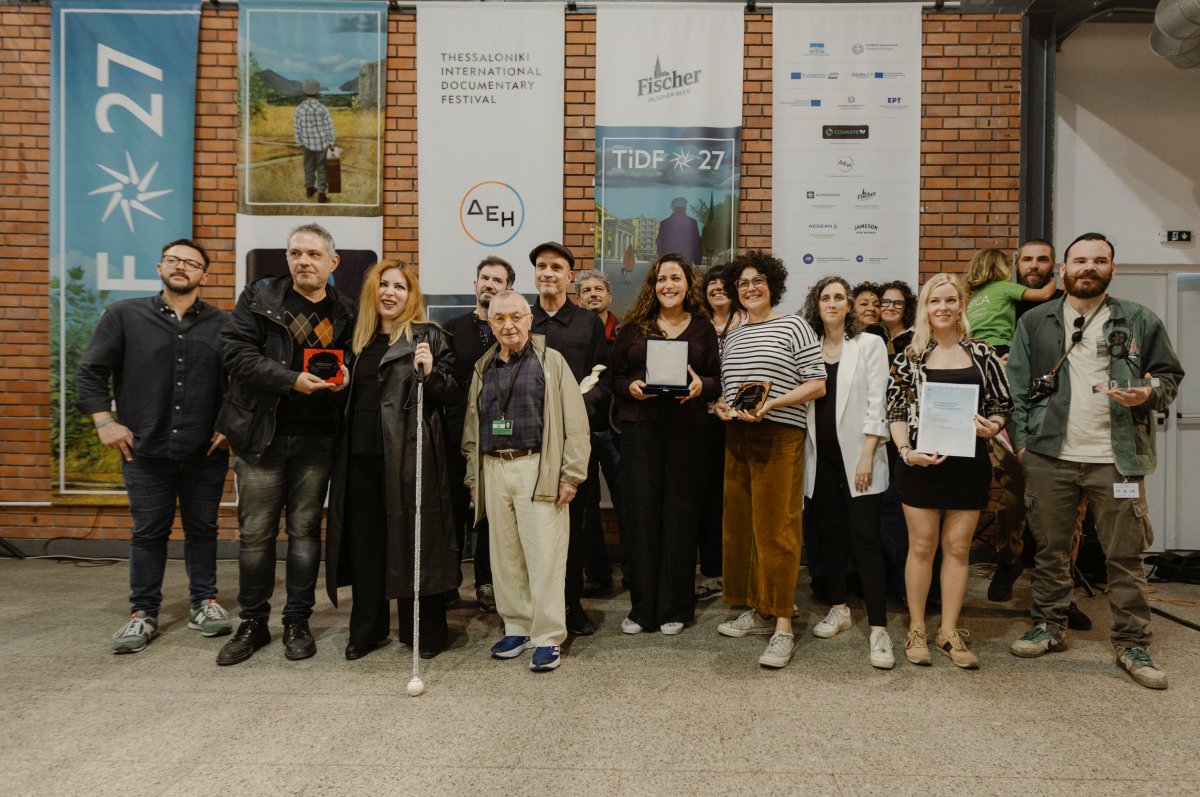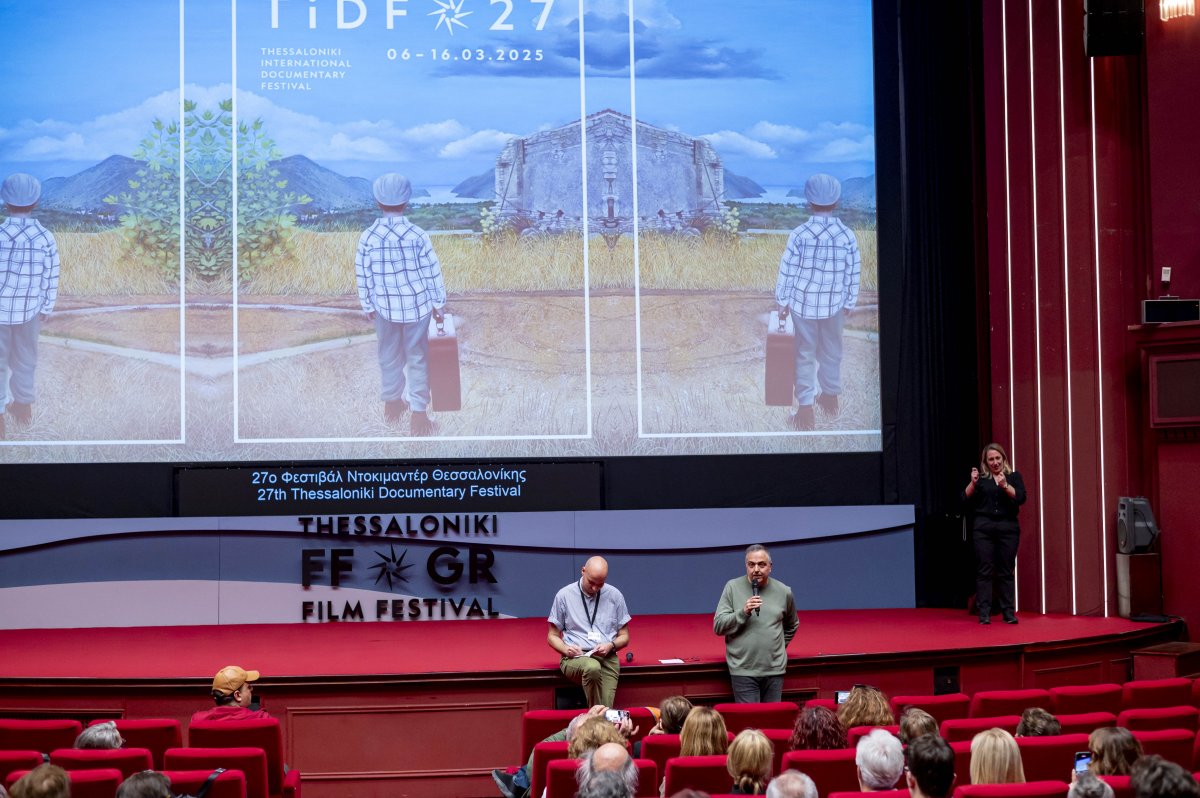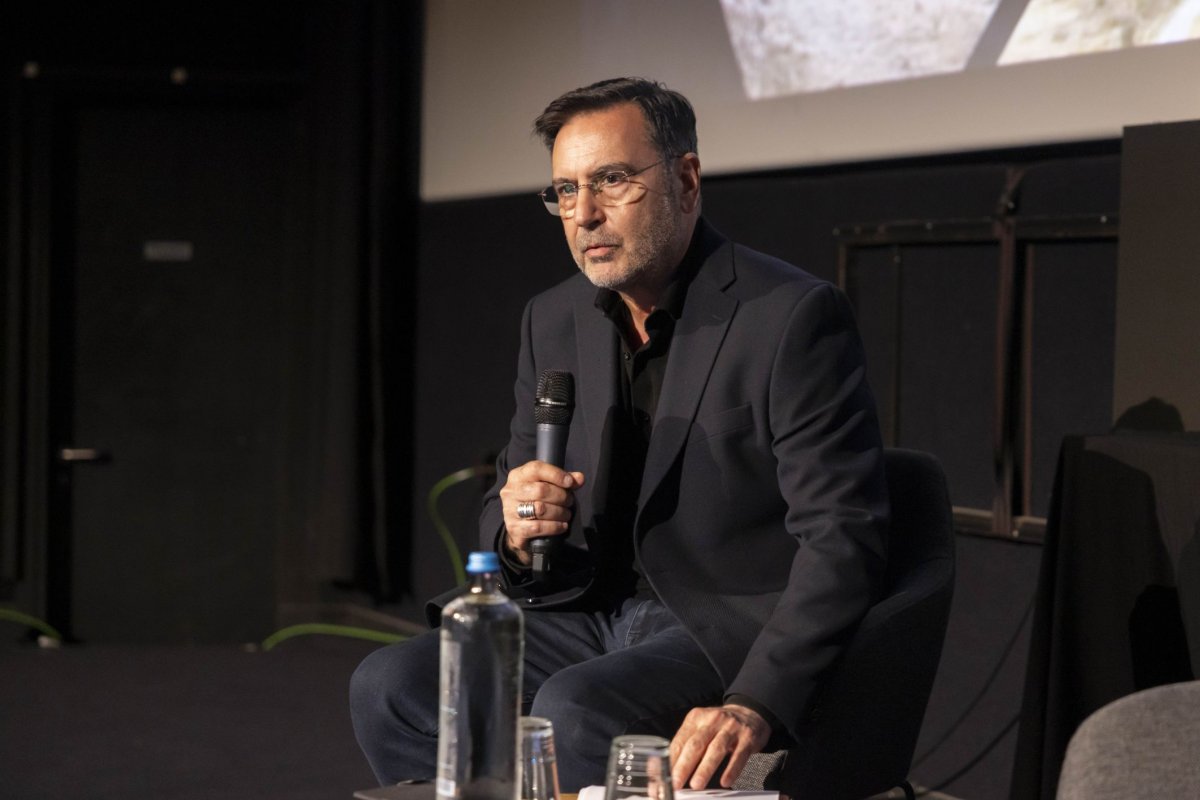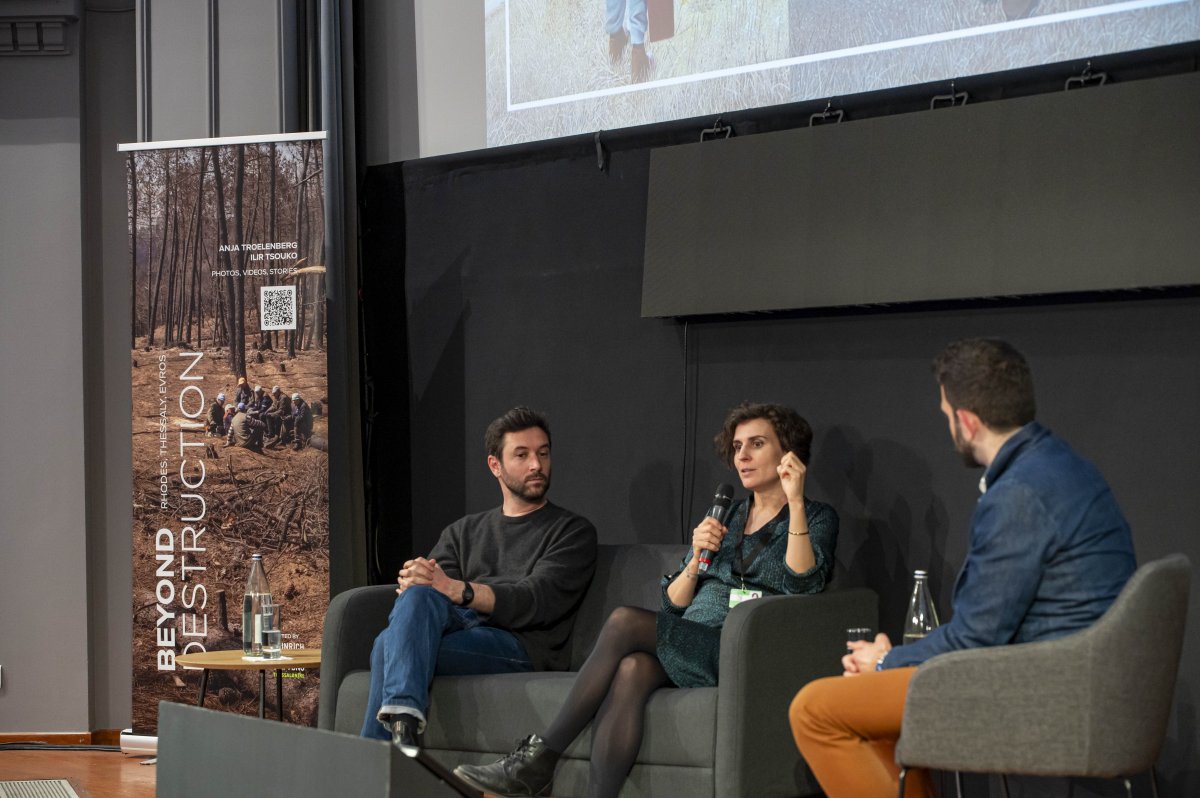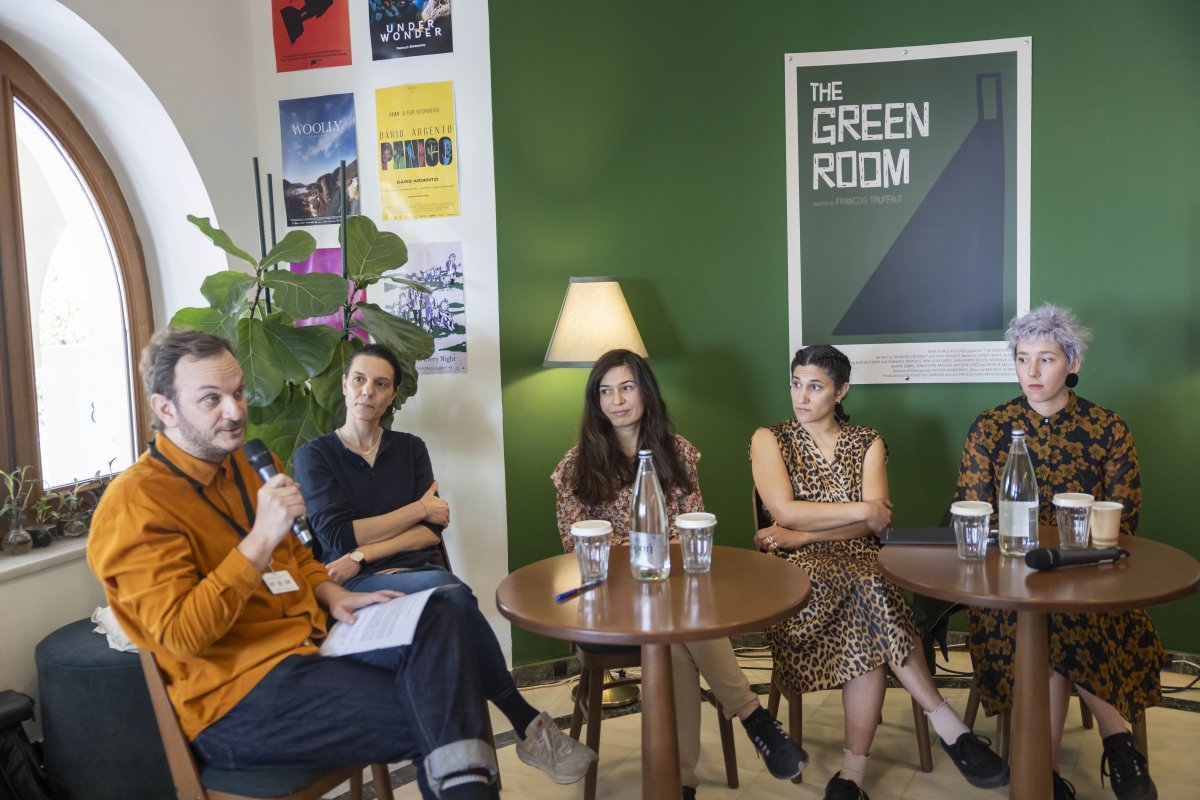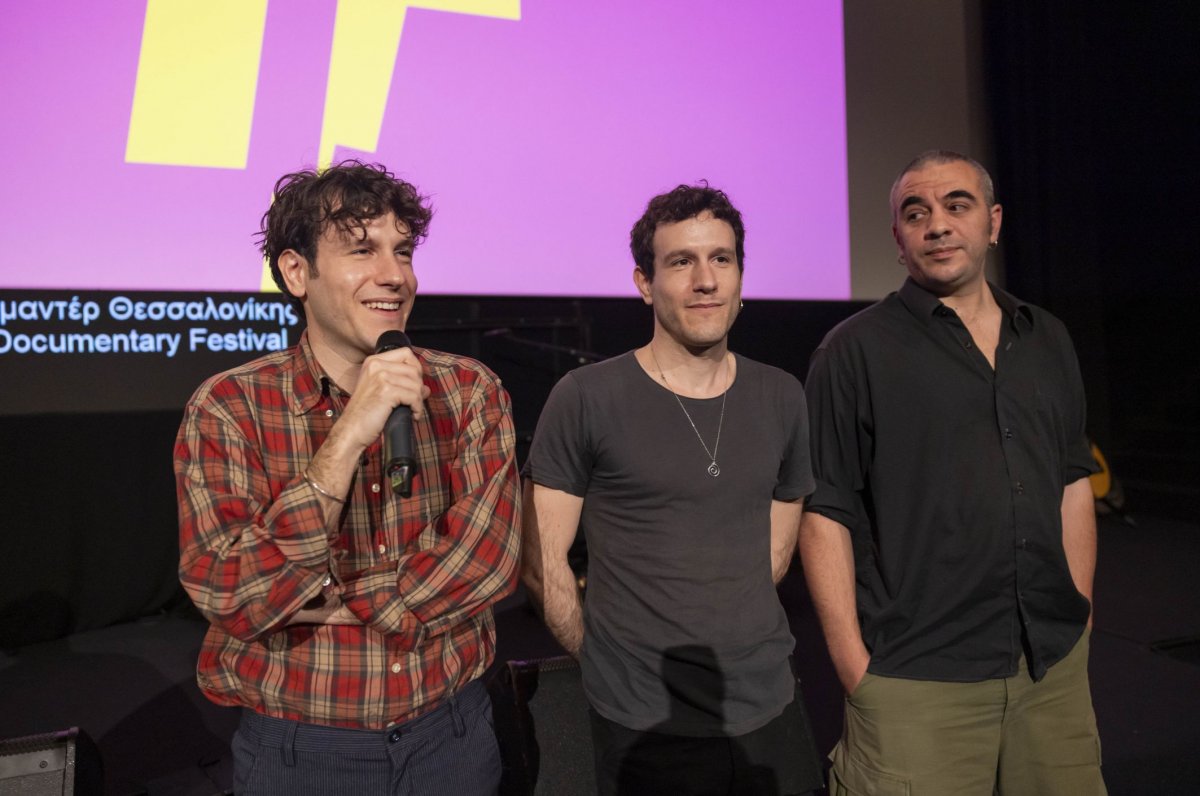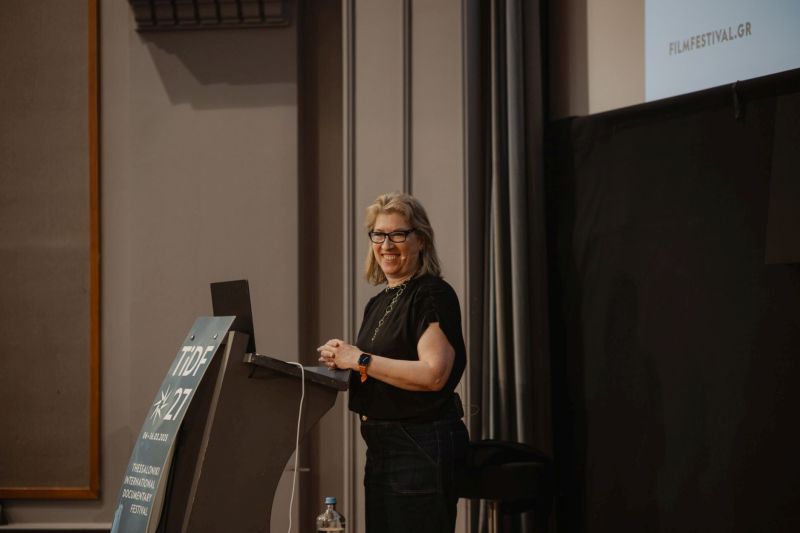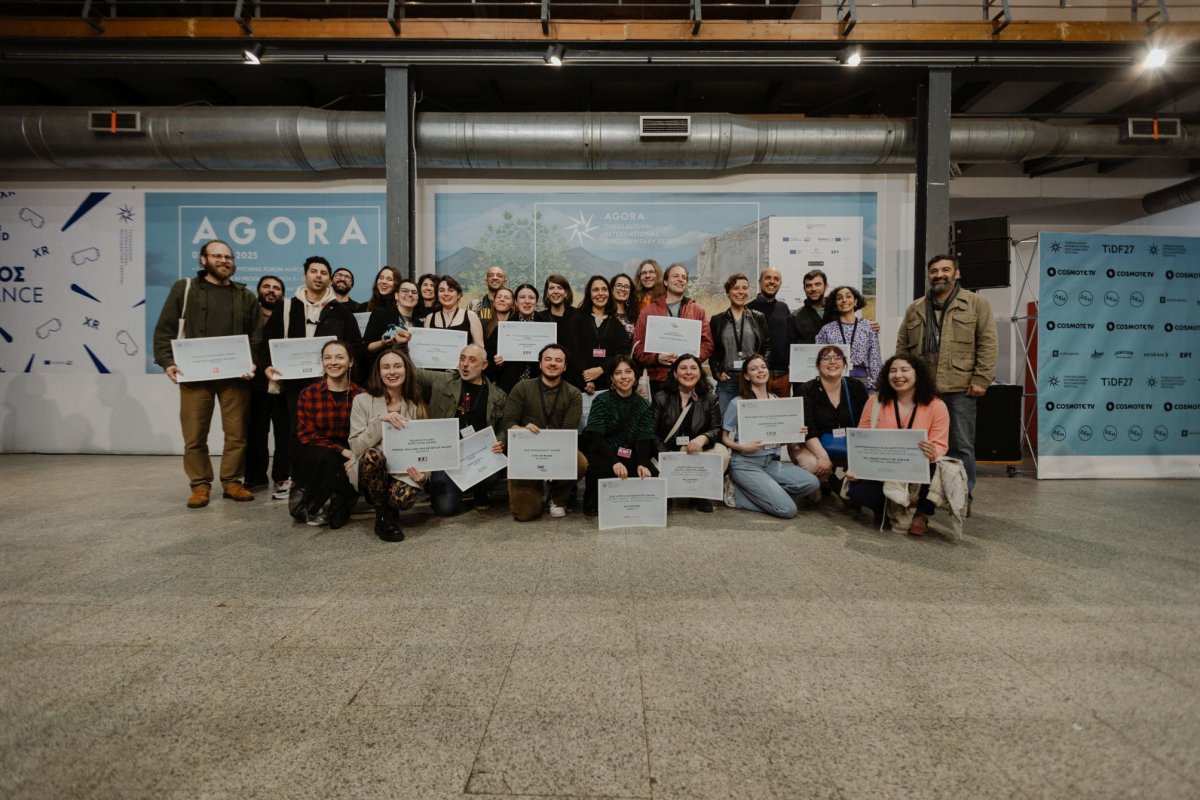With great pleasure, the 27th Thessaloniki International Documentary Festival announces the films taking part in the three competition sections of this year’s festival edition: the International Competition, the Newcomers competition section and the >>Film Forward competition section. The competing documentaries are holding their world, international, or European premiere in the Festival, and have their eyes set on the Festival’s official awards, as well the independent awards, most of which are accompanied by cash prizes. The International Competition Golden Alexander winner will automatically be eligible to submit for Academy Awards® consideration in the Documentary Feature category.
The 30 documentaries taking part in the three competition sections – including 9 Greek productions – touch upon burning and up-to-the-minute issues, cope with transgenerational traumas, envision the emancipation from every form of oppression, contemplate on humanity’s future, map our relation with the environment and stand up against all discrimination and prejudice.
International Competition
The ten films taking part in the International Competition of the 27th Thessaloniki International Documentary Festival (March 6-16, 2025) will be vying for a series of prizes, among them the Golden Alexander, accompanied by a cash prize of 12,000 euros, and the Silver Alexander, accompanied by a cash prize of 5,000 euros. TiDF is an OSCAR® qualifying festival and the film that wins the Golden Alexander award will automatically be eligible to submit for Academy Awards® consideration in the Documentary Feature category.
The Jury is composed of Dimitris Athiridis, photographer, documentary filmmaker, producer, and editor, Lauren Greenfield, filmmaker, and Signe Byrge Sørensen, producer.
Here’s the lineup of the International Competition:
For two years, Eva Stefani’s camera documents the preparation and tour of Transverse Orientation, a performance by the renowned Greek artist Dimitris Papaioannou. The central question that runs through the documentary is “Why do we do what we do?” elevating art as a means of resisting the futility of things and a way to reapply meaning to our own lives.
For 26 years (1972–1998), Swiss dentist Julien Grivel treated Hansenites (lepers) pro bono in Greece. An inner journey that helped him see the world and life differently. “By adopting the language of the Greeks, I unconsciously adopted their thinking,” he says. His friendship with ex-hansenite Manolis Fountoulakis was a catalyst.
The Goals of August is a kaleidoscope of events, incidents, and moments from the everyday life of a village in the southern Pindos mountains. during an impromptu football tournament. The documentary aims to create, through observation, an “impressionistic” portrait of a small community in its summer aliveness. A portrait with light and shadows, charming and sometimes frightening, which, despite its contradictions is above all unexpectedly alive and genuine.
Sang is one of the thousands of unwanted and marginalized children abandoned by American soldiers after the Vietnam War. At 55, his lifelong dream of finding his father finally comes true, but he must race against time. Before their long-awaited reunion, Sang must confront his own weaknesses, internal conflicts, and the deep scars of war - wounds that have not only shaped his life but have haunted the generations that followed. His journey to the United States forces him to face profound questions about his identity while struggling to bridge the gap between two vastly different worlds and cultures. Reuniting with his father offers a sense of redemption, but not without challenges. Fifty years after the war's end, the wounds remain wide open.
Comedian Noam Shuster Eliassi creates a personal and political one-woman show about the struggle for equality in Israel/Palestine. When the elusive coexistence she’s spent her life working toward starts sounding like a bad joke, she challenges her audiences with hard truths that are no laughing matter. With a narrative backbone of Noam Shuster Eliassi’s brilliant stand-up set developed at Harvard University and filmed before a live audience, the film documents not only the shifting perspective of Eliassi – a UN diplomat turned comedian – but also the unfolding realities in the region and the resulting seismically dynamic discourse surrounding it. Audiences will come away with a laugh, a tear, and an openness that feels all together like both a salve and a kick in the ass.
Directed by Jesse Short Bull (Lakota Nation vs. the United States) and David France (How to Survive a Plague, The Death and Life of Marsha P. Johnson, and Welcome to Chechnya), and produced by Bird Runningwater, the film follows Leonard Peltier, one of the surviving leaders of the American Indian Movement, who has been in prison for 50 years following a contentious conviction. A new generation of Native activists is committed to winning his freedom before he dies.
At Milan's Niguarda Public Hospital, the unconventional Dr. Maurizio Bini and his team offer medical care to couples aspiring to be parents through IVF, as well as to people wishing to undergo gender-affirming surgery. Dr. Bini’s team, composed of doctors and nurses, works decisively against the constraints imposed by a conservative government and an aggressive market eager to commodify the human body. At a time when reproduction and gender identity often turn into a battlefield for political controversy, it is easy to miss the quintessence; it is a surgical procedure carried out by medical professionals well versed in such knowledge. Niguarda is one of the few public hospitals in Italy where these kinds of procedures are allowed. The filmmaker shadows Dr. Bini and his team for months, capturing their work through a cinematic lens overflowing with compassion. With great sensitivity and attention to detail, he encapsulates the commitment, care, and depth that permeate the relationships between doctors, nurses and their patients.
In the remote village of Kök-Tash, Kyrgyzstan, where conservative norms confine women to domestic duties, an activist organizes a women's football tournament to challenge these patriarchal traditions. Stunningly filmed, visually captivating, and quite evocative, Kick-Off demonstrates how athletics has the power to break taboos, opposing the norms of traditionalism, while promoting gender quality in rigidly patriarchal societies, where women are left with no choice but to occupy the margins of solely inflexible, highly restrictive roles. Sports and play, being the most natural expression of human joy - unbound by limitations and uncontained, are the best response to the sullen “no’s” imposed by any form of oppression. With masterful aesthetics, cinematic power, and a splendidly fluid directorial approach, clear of any pretentiousness, this riveting film by Roser Corella and Stefano Obino, introduces us to a faraway world that is simultaneously so near us in our need for freedom, self-determination, and revolution.
Mathu, a medical doctor, grew into the complete opposite of his father, a spiritual healer. While Mathu is an ascetic loner, Malby was a hedonistic womanizer. Mathu's controlled reality unravels when Anna, a Malby devoted believer, tries to convince him that his father saved her life through telepathic healing. He is now forced to come to terms with his family trauma, while challenging Anna’s beliefs. The confrontation turns into an exploration of the opposite beliefs between Science and Magic.
In 1989, the fall of Alfredo Stroessner’s 35-year dictatorship in Paraguay marked the end of one of the world’s longest authoritarian regimes, but also the abandonment of the audiovisual archives that had cemented its power. This footage, crafted to shape a national identity and celebrate the regime, was left to fade from memory. Decades later, a trove of unseen and long-forgotten footage – as newsreels, public television broadcasts, propaganda films, and declassified documents – has been recovered from Paraguay and abroad, revealing the hidden mechanisms of power behind Stroessner’s rule. A visual experience through the history of the media, covering all the supports that have been able to store pieces of memory during the 20th century. The found Paraguayan footage reflects the appropriation of the past to indoctrinate, the construction of a national imaginary, and the cult of Stroessner. The foreign archives narrate the Cold War, international alliances, and the power game that allowed the dictatorship to prosper, in addition to denouncing propaganda and oppression. It is an archeology of the present, in a country where the descendants of the regime's leaders still rule.
Newcomers competition
Ten films of over 50 minutes in length, created by young filmmakers, will compete for the Golden Alexander “Dimitri Eipides” and the Silver Alexander Award. The Golden Alexander “Dimitri Eipides” award is accompanied by a €10,000 cash prize. The Silver Alexander Award is accompanied by a €4,000 cash prize.
The Jury is composed of Inka Achté, filmmaker and DOCPOINT Head of Programming, Tina Mandilara, journalist, and Tünde Skovrán, filmmaker.
“A year after my mother’s death I return to the empty Athenian apartment of my childhood to deal with a problematic inheritance. From the now bare surfaces of the flat fragments of my family’s memories emerge, intertwining my personal history with the collective trauma of the Greek Junta.” (T.V.)
Over the past 50 years, Mykonos has experienced sweeping transformations. What was cheap became unaffordable; what was sparsely populated became a top destination, crushed by mass tourism; what was a symbol of inclusivity became one of exclusivity. What happened? How did total freedom and self-expression give way to something so different? Were the seeds for what it became planted in the 1970s? Was it about the people and their unquenchable thirst for freedom or was it something more?
Poetic, dramatic, funny, MTV kids growing up on the Greek island of Corfu, Kore. Ydro. conquered the Greek indie pop/rock scene like only a few bands did, receiving both adoration and derision. The documentary follows their journey, focusing not only on the two core members but also on the importance of being special, without feeling ashamed.
Shiro and Wachuka attempt to convert a derelict, trash-filled library in the heart of Nairobi into a vibrant hub of culture and creativity for the city’s inhabitants. The building in question, the historical McMillan Memorial Library, built in 1931 by British colonizers, was exclusively reserved for white people until 1958. The two women, determined and dedicated to their cause, took on the ambitious project of the renovation works in 2017. However, as they go through the archive material, conflicted emotions arise within them – anger and appreciation in equal measure – as they grapple with the dilemma of which elements of Kenya’s colonial heritage are worth preserving and which should be left to obscurity. By capturing the complicated process of the library’s restoration, the bureaucratic hurdles, and the precariousness of the project in the face of political change, the filmmakers, Maia Lekow and Christopher King, simultaneously manage to explore another pivotal question; when are compromises justified in the wider debate on acknowledging and offering restitution for colonial heritage?
Jo and Allie, a trans couple from Sunnyside, Queens, have built a life together that defies easy categorization. Their journey begins with a serendipitous meeting on a dating app in 2016, leading to their marriage two years later, yet their path is filled with challenges they could never have anticipated. Despite the persistent discrimination and systemic barriers they face as trans individuals, their love remains their guiding force. As they navigate their transitions, careers, and family dynamics, resilience, support, and fulfillment prevail. Through moments of joy and vulnerability, My Sunnyside invites viewers into the intimate and evolving world of two people committed to forging a future together, even as the unexpected continues to reshape their lives. Tender, compassionate, and uplifting, their story becomes a celebration of love, identity, belonging, and the transformative power of finding family in the most surprising places.
Amidst the maelstrom of war in Ukraine, three drag queens – Diva Monroe, Marlene, and Aura – refuse to abandon their homeland. Instead of fleeing, they choose to fight: for freedom, the LGBTQ+ community, and their very existence. From the glamour of the show to the brutality of war, the film follows their lives – filled with loss, fear, as well as indomitable courage. Marlen grapples with old wounds, Diva Monroe finds herself once more, and Aura fights for a place both in the army and onto the stage. A charity drag show they organize to support Ukraine turns into a symbol of unity and resilience. The film is a story of self-discovery, love, hope, and the power to find joy even in the darkest of times.
Joakim is a 40-year-old Norwegian man who had one dream ever since he was a child: to create a farm, where he would raise foxes for domestication and later sell them as pets. Solitary, eccentric, shrouded in a mystical melancholy, Joakim fights for his farm and leads a withdrawn life, with only his pets and a neighbor for company; a Slovak immigrant who also lives ostracized, as an outsider. Set against the backdrop of the grandeur of Scandinavian nature – exquisitely depicted on the film’s stunning cinematography – and accompanied by an evocative string soundtrack that emphasizes the melancholy permeating the characters, Pet Farm masterfully paints the portrait of a man who seems to embody the verses by Yorgos Seferis: “Tortured by my own shirt / condemned by my own gods.” With tenderness and love for its protagonist, the film touches on the unshakeable bond between man, animal, and nature in a profoundly touching manner.
Amid the vast greenery of the Czech countryside, Pavel quietly tends to spring meadows damaged by deforestation, preserving rare plant species, while Klára, working with the Czech Ornithological Society, scours the land for illegal bait traps with the help of her loyal dogs, uncovering threats to local fauna. When she stumbles upon the poisoned body of a white-tailed eagle, a tense investigation unfolds, revealing the disturbing presence of a serial wildlife killer. As the search for answers deepens, Resilience evolves into an urgent, suspenseful inquiry, blending environmental documentary with the pulse of a crime thriller. The film challenges us to reflect on humanity’s role in a world teetering on the brink, highlighting the profound fragility of nature and the dire consequences of our actions.
It’s 1995 in Baton Rouge, Louisiana. During a feminist studies class, college student Kristi opens her textbook to discover something that turns her world upside down. For as long as she can remember, Kristi has felt different- now she knows why. Demanding her medical records, Kristi is finally confronted with the devastating truth: she has been lied to all her life by those she trusted the most. What follows is the unearthing of an extraordinary and disturbing secret that goes far beyond her own life, leading to the discovery of a psychology experiment on a pair of twins – once hailed as a revolutionary success but now revealed to be a terrible lie affecting thousands around the world.
Yamashita's Gold is a mythical, untold treasure, allegedly buried by the Japanese Army across the Philippine archipelago during World War II, with the prospect of retrieving it in the future. According to the legend, most of it remains concealed beneath the ground to this day. Treasure hunters from all over the world have tried to obtain it, including Jack and his father, who have dedicated their lives to this pursuit, spending millions of dollars in the process. The Treasure Hunter tells the agonizing and archetypal story of a treasure hunt, as if taken straight out of a (dark) fairytale. But it is much more: at the heart of the film pulsates the tragic nature of a son who strives to earn his father’s affection, falling prey to one mistake after another akin to a hero from an ancient tragedy, only to end up with a bitter self-awareness. Visually stunning, masterfully edited, and the culmination of seven years of filming, The Treasure Hunter crafts the portrait of a memorable and agonizingly familiar character.
>>Film Forward
>>Film Forward competition section, hosting movies that challenge conventions and utter a bold and daring cinematic language, offers the audience the chance to watch ten films.
The awards include the >>Film Forward Golden Alexander, featuring a 6,000-euro cash prize, and the >>Film Forward Silver Alexander, featuring a 3,000-euro cash prize.
The Jury is composed of Nadja Argyropoulou, curator and art historian, Grant Keir, producer, and Anne Marie Kürstein, festival consultant.
Here’s the lineup of the >>Film Forward competition section:
In lockdown hibernation, an outcast like an invulnerable superhero, plans an epic escape for himself and his dog; he wants to escape the deadliest virus: life itself. An adventurous death trip that will magically drive them both from their hovel to the wild mountains and up to New York, from suffocating reality to absolute freedom.
Among Athenian balconies, fragmented images, sounds, and fleeting and incomplete stories emerge. The seasons change, the significant intertwines with the insignificant, and beauty and ugliness coexist. Weather phenomena, absurd circumstances, events, human gestures, and other fragments of life weave together the spectrum of an urban ecosystem.
In the twilight of a post-apocalyptic age, an intergalactic traveller seeks the sacred language of birds on the last remaining planet. With an artificial mind as her companion, she will learn that even in the stillness of silence, the desire to communicate endures, unyielding and eternal.
Exploring the complex bond between two half brothers — one Indigenous, one white — traveling from the present in isolated Shamattawa to bustling 1980s Toronto. Seth and Peter Scriver’s endearing handcrafted animated hangout film sweetly careens through issues of race and identity, making observations about city and reservation life that spring geysers of giggles everywhere it treads. From trying to make a documentary with clean sound while raising nine kids and a bunch of dogs, to incredible grocery and game trapping adventures, the Scrivers spin love yarn around their community, and the Caribou who make the kids do things they never thought they would. Sharply observed and rooted in an Indigenous resistance to colonialism, Endless Cookie is a smart, fun-to-watch documentary that sits gentle in its own skin. Pete and Seth offer an oral history and a cosmic vision as they unravel their bittersweet testimonials of life under the Canadian sun.
“In 1979 the Virgin of Zikuñaga disappeared, leaving its inhabitants without her iconic image. A gap in the niche. A collective void. This is a film about gaps. My father, the filmmaker Juanmi Gutiérrez, passed away some years ago. Now, from a distance, I return to his films in an exercise of personal memory through the image, or rather, through its absence. ‘Can the lack of an image be as strong as its presence? And in that case, what do we do with this emptiness?’”
Meanwhile is a docu-poem in six verses about artists breathing through chaos. Through a dynamic collaborative process, the artists’ expressions are combined with historical and observational footage to unveil a rare cinematic meditation about identity, race, racism, and resistance as they shape our shared breath. Meanwhile is not just a film; it's a journey, a conversation, an experience not an education, reflecting the chaos of existence and the beauty found within it. Since its inception in 2020, this cinematic poem has been a communal effort to explore the complexities of truth and identity. Cinema—like identity—is entirely constructed, merely and astonishingly, a practice.
1968, midnight. The Argentine artist Leandro Katz attends a performance by the Theatre of The Ridiculous in a New York pornographic cinema. The actors, exuberant, perform in drag, undress, and recite texts that blend high literature with queer slang. Fascinated by the experience, Katz decides to join the company as a collaborator. Between 1970 and 1976, he takes photographs, assists with lighting, and creates experimental works on film. However, he eventually leaves the company when the experience becomes too intense and his artistic work takes a different direction. Today, from his dimly lit apartment in Buenos Aires, Katz revisits his materials: images of the deceased, photographic records, slides, negatives, and works on film and video. He discovers an unfinished film believed to be lost. As the conversation and testimony unfold, attempting to approach those years, the specters of the past seep through.
A deeper connection to tradition, a link to historical roots, and the seeds freely offered by the earth (including the very identity of its people) are only but a few of the invaluable gifts a farm can provide. In Seeds, one of the most breathtaking observational documentaries of recent years, the camera lens captures the ethereal essence of the concept of legacy. Through an intimate look at the life of an Afro-American family of farmers in the rural South, Brittany Shyne’s exceptional directorial debut captures how these people bravely withstand systemic racism to maintain their hold on their land – and be maintained by it in return. Without neglecting to address the political dimensions of this issue (and by exposing the American government’s responsibility for the increasingly dwindling landed property over the years), Shyne reveals a far-reaching directorial and aesthetic vision. A visually captivating film with an almost tangible sense of melancholy.
"Where do you call home?" was the question faced by nearly 3,000 Spanish children exiled in the Soviet Union during the Spanish Civil War (1936-1939). This film tells the story of one of them, Angelita Perez, who lived in Russian boarding schools from ages 4 to 24 until completing her medical studies in Moscow. It is a tale of resilience, love, and identity, intertwining past and present, history and memory. It also explores the bond between a mother and daughter – the director and her mother – through shared songs and stories. Revisiting Angelita’s journey is both a tribute to her strength and a declaration of love.
The true crime genre’s ubiquity is driven by people’s endless fascination, disgust, and – bizarrely – search for comfort in genre conventions that still have the ability to generate complex emotions despite their predictability and familiarity. Having tried and failed to make a documentary about the infamous Zodiac Killer, filmmaker Charlie Shackleton walks the viewer through what his film would have been like and why, using Bay Area landscapes, reenactments, film and TV clips, and voice-over. In this wholly original, self-aware cinematic work, a filmmaker chews over what might have been and playfully probes the inner workings of a genre at saturation point. A captivating and entertaining experience that will forever change how you watch your next murder program.


